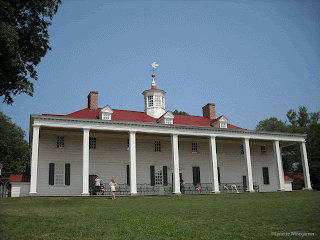--> I thought it would be fitting to start our journey with the man generally known as the Father of the Constitution, James Madison, Jr. Madison was the son of Virginia planter, James Madison, Sr. and Nelly Conway. Born in March 1751, I found some discrepancy as to the actual date, at his grandparents in Port Conway, King George County, Virginia. Madison was raised at Montpelier, Orange County, Virginia. When it came time for the young James to go to university, his father felt that he would be better served by the College of New Jersey at Princeton than by Virginia’s College of William and Mary.
A lawyer by training, politics became his career. By the age of 25 Madison was a member of the Virginia House of Delegates. A mere 5 years after graduating Princeton he wrote Virginia’s new constitution. He was a young man on his way up.
Madison was in his mid-thirties when he helped put together the Constitutional Convention of 1787. A young man, unmarried, still living off an allowance from his father, who in just a few years managed to garner the respect of both Thomas Jefferson and General George Washington as well as be a principal player in creating a new nation. While Madison was neither a formidable fellow, at 5’2” he was short even by the standards of his day, nor an engaging public figure; Madison still proved to be a powerful force. His strength lay in his ability to plan, see both sides of the issue, and quietly persuade others that his ideas would work. A master of what would come to be known as the “back room deal,” Madison arrived in Philadelphia for the start of the Convention several weeks early. He used the time to scout out the hall and to think strategically about the issues and potential compromises. He even went to so far as to develop a seating plan for the meetings. As other delegates began arriving, he took the time to get to know those he didn’t already know, sound everybody out about where they stood on certain issues, and plant the seeds that would spring forth during the Convention debates.

--> Madison would continue in politics and served in the U.S. House of Representatives. In 1794 Madison would meet his match in a young widow, Dolley Payne Todd. They would marry later that same year. It’s fitting that such a remarkable man should marry such as unique woman. As Madison continued to rise in national politics; Dolley kept pace. In 1801 Madison became Secretary of State to President Thomas Jefferson. As Jefferson had already lost his beloved wife and his daughters had not yet been introduced into society; Dolley stepped in to both introduce Jefferson’s daughters to Washington society and serve as the White House hostess. In 1808 Madison was elected President. During Madison’s two terms as President, Dolley would begin defining the role of First Lady. After his presidency, Madison and Dolley returned to Montpelier and on June 28, 1836 President Madison died at the age of 85. Dolley returned to Washington after Madison’s death, where she lived in the (now) yellow house on the northeast corner of Lafayette Square until her death on July 12, 1849. They are both interred at Montpelier in Virginia.












